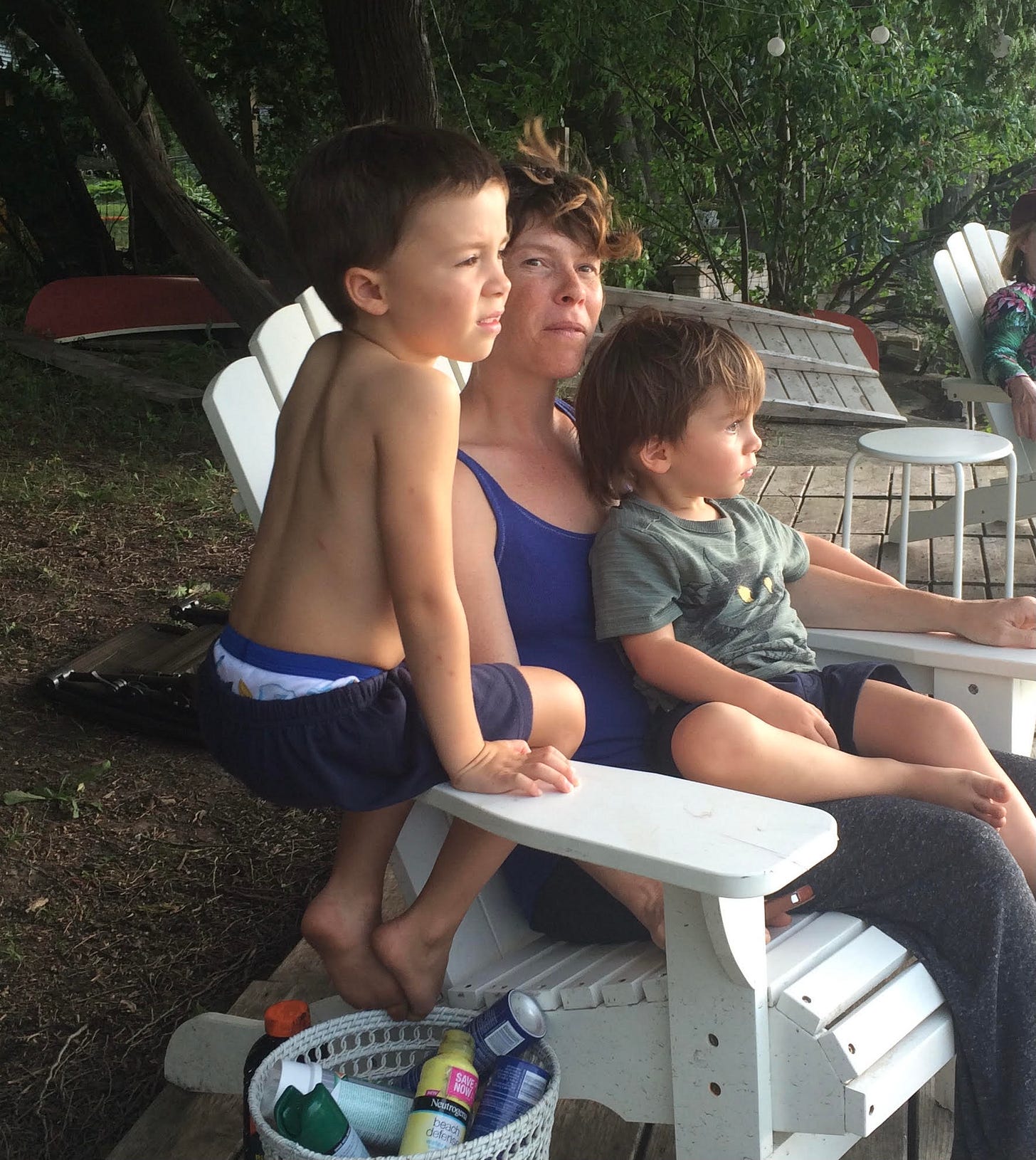ICYMI: In Monday’s Atlantic Daily newsletter, I argue that two years after Dobbs, the pro-life movement’s triumph looks more and more like a tragedy—not just for women, but for the movement as well.
In the meantime, I hope you’re staying hydrated as we prepare for the next few frenzied days — a blizzard of SCOTUS decisions, the presidential merdefest on Thursday, and the endless rounds of pre- and post-debate spin and whining.
Speaking of whining…. You have perhaps noticed the level of keening and mewling from MAGA World over that debate, which does not exactly give the impression of confidence, does it?
Happy Tuesday.
We need more dog pictures
You ask. We deliver.
Baby Eli says hello to his big brother, Pete.
**
Lake pups. Eli and Auggie.
**
Six-month-old Baby Eli floating with his mom.
Two Years of Flailing
My latest in The Atlantic: “How ‘pro-life’ lost all meaning.”
For the prolife movement, the end of Roe v Wade marked the triumphant culmination of a 50-year crusade. Nothing about it was secret: Getting rid of abortion was the focus of a large network of activists, a central theme in GOP platforms and campaigns, a litmus test for judges at nearly every level, and one of the decisive issues that bonded social conservatives to Donald Trump.
And yet…
… when the Supreme Court handed them their victory in Dobbs v. Jackson Women’s Health Organization, the pro-life movement and its Republican allies were woefully unprepared. Two years later, that triumph looks more and more like a tragedy—not just for women, but for the movement as well.
For five decades, being pro-life was an easy call for many Republican politicians, because with Roe in place, they were essentially shooting toy guns. In June 2022, they were handed live ammunition. But suddenly faced with a post-Roe world, Republicans flailed. They could not agree on whether the new bans on access should be subject to national legislation or left to the states. They couldn’t agree on the length of the bans (six weeks? 15 weeks?), whether to allow exceptions, or how punitive the new laws should be. Should doctors be jailed? Should women who had abortions be charged with murder? The absence of consensus created a political vacuum that allowed some of the most extreme activists to push draconian measures in their state legislatures.
Suddenly, Republicans were faced with a host of questions they never had to wrestle with before. Should abortion pills be banned? IVF? How should states handle miscarriages? (Earlier this month, the Supreme Court unanimously rejected a challenge to the use of the abortion and miscarriage-management drug mifepristone. But efforts continue to restrict the use of the drug, including a proposal from Project 2025, organized by the Heritage Foundation, to use the 19th-century Comstock Act to ban the mailing of medication used in abortions.)
And what about creating a “culture of life”? After all, this is what the term pro-life was supposed to represent. For years, some conservatives (Marco Rubio being among the most vociferous) argued that pro-lifers needed to embrace pro-child policies such as tax credits and increased access to health care. Some tried to create an infrastructure to support families post-Roe. But after half a century, they had little to show for it…
I saw all of this play out as a longtime supporter of the pro-life movement. I was the regular master of ceremonies of Wisconsin Right to Life’s annual dinner for more than a decade. For nearly 50 years, I was politically aligned with the folks who celebrated their victory in the Supreme Court. But I watched as a movement that should have championed compassion for women and young children instead tightened its ties to those who embraced performative cruelty, including forced family separations at the border. As I wrote two years ago, the Court’s ruling plunged “a fateful (and deeply personal) choice into the cauldron of the culture war at a moment of maximum demagoguery, extremism, disinformation, and bad faith.”
Although there has been progress in some states to strengthen the safety net for women and children after Roe, those steps have been overshadowed by the rush to enact punitive criminal bans. In the past two years, 14 states have enacted near-total bans on abortion, while three states have imposed six-week bans. Oklahoma is among the states that have banned abortion, with the only exception being to save the life of the pregnant woman. Some legislators want to go even further: A freshman state senator in Oklahoma has proposed legislation that would charge women who terminate a pregnancy (with limited exceptions) with murder. After Ohio enacted a sweeping ban on most abortions, young girls who had been sexually assaulted—including a 10-year-old—reportedly had to cross state lines to terminate their pregnancy (the Ohio law is no longer in effect—the state has enshrined abortion rights in its constitution). In Texas, the strict new abortion laws have generated confusion over how doctors should treat miscarriages, and the state’s “fetal heartbeat” law appears to have been associated with an increase in infant deaths, according to a new study. Last month, Texas’s supreme court ruled against women who said that the state’s abortion ban put their health at risk.
The fallout has dramatically shifted the public’s perception of the issue. As Kate Zernike writes in today’s New York Times, “The question is no longer just whether you can get an abortion, but also, Can you get one if pregnancy complications put you in septic shock? Can you find an obstetrician when so many are leaving states with bans? If you miscarry, will the hospital send you home to bleed? Can you and your partner do in vitro fertilization?”
The short-term political fallout has been intense. But the pro-life movement should worry even more about the long-term struggle.
Polls show that about 65 percent of Americans oppose overturning Roe. Among women ages 18 to 49, support for abortion rights is now overwhelming. Eighty-six percent say decisions about abortions should be made by a woman, in consultation with her doctor, and 76 percent support federal legislation guaranteeing the right to abortion.
In other words, the anti-abortion movement won the battle. But it may be in the process of losing the war, as well as the struggle for the hearts and minds of an entire generation, which is watching the indifference and cruelty toward women and wondering whether this movement really is “pro-life.”
You can read the whole thing here.
I have a personal story
Flashback. This is what I wrote two years ago as I sifted through my reaction to the Dobbs decisions. And trust me, this was not easy to write.
When I was a 19-year-old college student, with few if any significant life skills, I got my 18-year-old girlfriend pregnant. I will spare you the details.
The pregnancy, however, could not have come at a more awkward time; it meant that our educational plans would have to be scrapped. No graduate school for me; no undergraduate degree for her.
Worse, we were utterly unprepared and unsuited in every possible way for parenthood. And I am not engaging in any sort of false modesty when I tell you that my incapacity for fatherhood at that age cannot really be overstated. Emotionally, financially, and practically, I wasn’t prepared for what was about to happen.
I was an English literature major, which I enjoyed and where I learned quite a lot that has held me in good stead. But at the time, it was perhaps the most impractical degree imaginable; there was shockingly little interest among employers in my term papers on Paradise Lost. I was, in other words, utterly unemployable. Even in our contentious times, there was a broad consensus among would-be employers: Not Me.
So, by every rational, prudent, sensible, judicious standard in the world, it made no sense to go ahead. But we made a choice; and I fully understand that others may have made a different one.
And that choice was the most consequential of our lives.
My daughter is named Sandy and she is a beautiful and talented writer and artist. Her children — my grandsons — are named Elliott and Silas, and they are flying in from France for a visit in a few weeks to attend their uncle Alex’s wedding and meet their two cousins — Charlotte and Emilia [Tess arrived shortly afterward].
Decades ago, two stupid, incautious teenagers created whole worlds.
…
So where am I? How do I feel today about the demise of Roe v. Wade?
The short answer: it’s complicated…
I still think of myself as pro-life, but like my colleague Mona Charen, I’ve changed my attitude toward the movement itself, because I’ve lost my trust in the judgment and good faith of many of my former colleagues….
So I share David French’s conflicted reaction. In his weekend newsletter, he reviews his decades of work on behalf of the pro-life movement
Through it all, I was guided by two burning convictions—that Roe represented a grave moral and constitutional wrong and that I belonged to a national Christian community that loved its fellow citizens, believed in a holistic ethic of life, and was ready, willing, and able to rise to the challenge of creating a truly pro-life culture.
I believe only one of those things today.
You can read the whole thing here.
And finally
Nice Christian lady says…











Charlie, I don’t know if you read the comments, but as a liberal, unapologetic pro-choice fanatic, I’m thankful for your thoughts and story. I disagree with your opinions on abortion (and I’m still unsure exactly where you stand on what the law should be), but I’m really grateful that never-Trumpers have given people like me a way to discuss things rationally with folks across the aisle. I want all women to have abortions if/when they feel it necessary, but I also want more help for women with unintended pregnancies they’d like to keep. I like that I could shake your hand and still have a nice conversation about that and other things, which I might not have done pre-Trump. It’s the one benefit I can see in his wake.
“reportedly had to cross state lines to terminate their pregnancy” -
REPORTEDLY??????
You can do better than that Charlie. There is no question this happened.
Once again to state the obvious: Pro-choice does not mean pro-abortion.
It means - unlike the euphemism pro-life - exactly what it says.
It says that the decision should be left up to the parents and their doctors.
Otherwise, this is EXACTLY what I and many others predicted. You have lawyers and politicians and judges practicing medicine.
STOP IT!!!